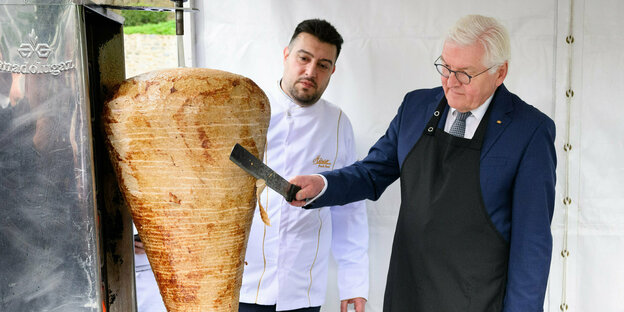A popular criticism is that Erdoğan should not exploit the German Turks. Federal President Steinmeier has done the same in Türkiye.

Failed gesture: Federal President Steinmeier in Istanbul Photo: Bernd von Jutrczenka/dpa
Germans like to queue for half an hour to eat their favorite kebab. As naturally as they complain about Deutsche Bahn when they arrive five minutes late. Because kebab is quality of life, lifestyle, philosophy of life. But kebab can also be stunning. This is the dialectic of kebab.
This is what you need to know if you want to understand the great enthusiasm generated by the gift from German President Frank-Walter Steinmeier on the occasion of his visit to Turkey. On his three-day trip he took Berlin restaurateur Arif Keleş with him and he in turn took his 60 kilo kebab skewer. At the reception at the German ambassador's summer residence in Istanbul's Tarabya district, Keleş showed his work to the public, including posing Steinmeier cutting kebab for the cameras, the gesture once iconized by Angela Merkel.
Reactions of shame and indignation predominated: the media called it “doner diplomacy” and the lawyer Seda Başay-Yıldız tweeted Like many others: “Speechless when they reduce you to a 'döner kebab'.” He represented the relatives of the victims of the far-right NSU murders, which for years were trivialized by the German public as “döner kebab murders.”
Of course, the popular cultural asset Döner can be presented as a symbol of the German-Turkish success story, just as the creators of the gift idea intended. But is this appropriate, given the political environment in Germany, in which a party that does not want German Turks to return to the kebab skewer, but rather out of Germany altogether, is gaining enormous strength?
Why is Steinmeier “paying tribute” in Türkiye?
However justified this question may be due to the disappointment it entails, it has obscured other questions in the debate of recent days that are quite serious and are not intended to be rhetorical at all:
Why does Steinmeier “pay tribute” to the “lifelong achievements of Turkish immigrants in Germany” (“Tagesschau”) during a visit to Turkey when these “Turkish immigrants” and their descendants live in Germany? Why does she focus her visit to Turkey on this topic, which deals with diplomatic relations with a country to which today many Germans of Turkish origin only go on vacation? And why hasn't she yet sufficiently acknowledged her life's work?
“Today there are almost three million people of Turkish origin living in our country who help mold and shape our society. “They helped build our country, they made it strong and they belong to the heart of our society,” said the federal president at the beginning of his visit at the Sirkeci train station in Istanbul. Except that the people he was talking about left this train station heading to Germany more than 60 years ago.
After years of discord, Germany and Türkiye are getting closer again. German diplomacy wants this, especially with a view to the wars in the Middle East and Ukraine and Turkish influence in them. This was demonstrated by the friendly treatment the presidents gave each other during this visit. The problem: there are no common points beyond the economic relations to which they can refer.
Doner kebab, sliced and twisted
The contrasting attitudes toward war in the Middle East are just the most striking example of this. Another example is Steinmeier's three visits to politicians from the opposition CHP. It has been a long time since anyone has talked about the incompatible ideas between democracy and human rights. A version of the history of German-Turkish migration in which its painful and degrading aspects no longer appear remains the only thing that a federal president has at his disposal to create closeness.
Every time Turkish President Recep Tayyip Erdoğan has tried to absorb German Turks in recent years, for example before the Turkish elections, German politicians have criticized him. He sees them as voting animals and bargaining chips that can be manipulated. He should not mix his political interests with their concerns. But now the German federal president has mixed both things.
What the kebab represents, whether it appears as a symbol of self-empowerment and autonomy or exploitation and racism, depends on the context in which it is shot, cut and consumed.
As if he had to justify their existence, Steinmeier emphasized in his speech at the Sirkeci train station that guest workers and their descendants “are now making a decisive contribution to our prosperity in four generations” – and added economic benefits to their political benefits. . Restaurateur Keleş responded to a journalist who asked him about the secret of his kebab: “The meat, the sauces, the mix of spices… and always working in a clean and disciplined way.”
